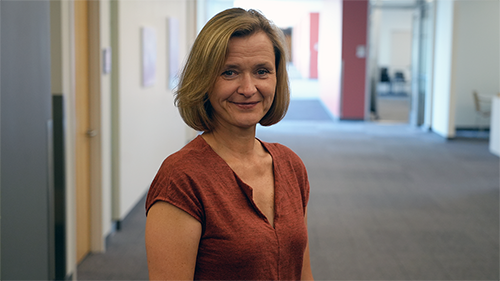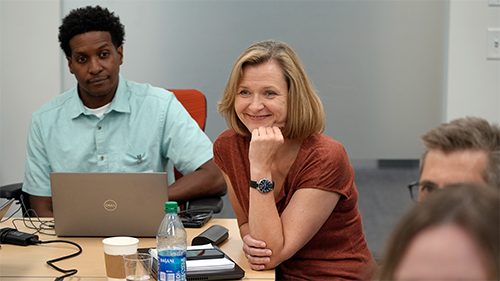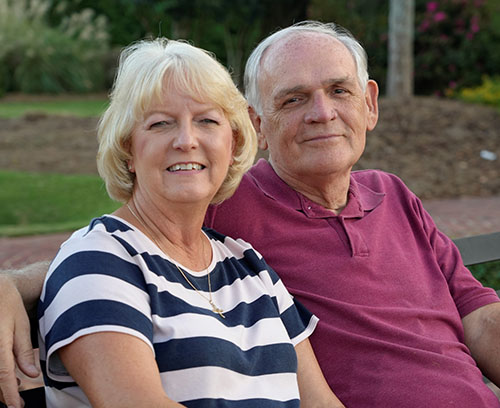The future patient who teaches the present doctors
Heidrun Behrmann has a unique problem: Finding a renal denervation specialist who doesn’t know her name.
Heidrun Behrmann has a unique problem: Finding a renal denervation specialist, anywhere in the world, who doesn’t know her name.

“The idea of going into the cath lab and being treated by a physician that I know from training is not very appealing to me,” Heidrun laughed. “So I want to find specialist who doesn’t know me.”
That’s going to be quite a challenge.
In the renal denervation universe, Heidrun is a rock star. She’s personally trained most of the physicians worldwide who use our Symplicity blood pressure system, a revolutionary new technology that was recently approved by the FDA to perform renal denervation.
Hypertension runs in Heidrun’s family, and she developed high blood pressure a few years ago. Medication is controlling it for now, but eventually she hopes to undergo treatment using the Symplicity blood pressure procedure.
A 14-year journey
The Food and Drug Administration’s (FDA) approval of the Symplicity blood pressure procedure marks the culmination of a remarkable 14-year journey to bring the procedure to patients.
Medtronic acquired the technology by purchasing Ardian in 2011. Heidrun is the only employee of the original Ardian still working at Medtronic.
A nurse by training who also has a business degree, she started as a project manager for Ardian, working as a consultant.

“The science behind this fascinated me from the beginning,” said Heidrun, who is now director of training and education in our Coronary and Renal Denervation operating unit and based in her native Germany. “The idea of modifying the sympathetic nervous system to improve blood pressure, and to meet this enormous worldwide need, was very exciting to me.”
Her desire to “stick with this technology a while longer” helped convince her to accept a full-time position with Medtronic after the acquisition. Renal denervation was approved in Europe several years ago; Heidrun’s role in not only procedure training but also educating physicians worldwide about the science behind renal denervation has been vital to the business.
”We asked her to multiply herself”
But in early 2014, she feared the entire renal denervation effort in the United States would end. Results of a major clinical study (Symplicity HTN-3) indicated renal denervation might not be effective. Many other companies working in the space gave up on renal denervation research. Medtronic did not.
“It was definitely not fun for a while. I would speak to groups of physicians who asked ‘Why is Medtronic still doing this? It doesn’t work.’ But I was always a believer,’” she said.
One of many factors in explaining the initial negative results of the study involved how physicians used the device. The data indicated that physicians trained by Heidrun had better results than those trained by someone else.
“That was an incredibly important learning for us, that we needed to be more rigorous and intentional about how we train for this procedure,” said Sean Salmon, EVP and President of our cardiovascular portfolio. “She commands a lot of respect from the people she trained. We essentially asked Heidrun to multiply herself.”
Now that FDA has approved our system in the U.S., many thousands of people will have access to a new method of treating high blood pressure.
“I recently met a renal denervation patient who is only 20 years old, and medication wasn’t controlling her high blood pressure. Although results tend to vary in this patient population, our technology is helping give her the opportunity to live a healthier life. That’s very gratifying and it’s what really drives me,” Heidrun said.
She’s quick to downplay her role in our renal denervation journey and continually praises her “fantastic team” for the work they also do in training and educating physicians. Her 22-person-team counts members in Italy, the UK, Japan* and the U.S. and includes “so many great, talented trainers” that in the last few months Heidrun has been turning all physician training sessions over to them.
Heidrun believes the same technology that she has devoted so much of her career to supporting will eventually help her control her own high blood pressure. But not until there’s a renal denervation physician, somewhere in the world, who doesn’t know her name.
“A little while longer,” she laughed.
* The Symplicity blood pressure procedure is not yet approved in Japan
Important Safety Information
The Symplicity™ blood pressure procedure (BPP) is a minimally invasive procedure approved to help lower high blood pressure. The procedure is approved as a complement to treatments you may already be trying, such as lifestyle modifications and high blood pressure medications that might not be adequately controlling your blood pressure.
Receiving the Symplicity BPP should be a based on a joint decision between you and your doctor consider the benefits and risks of the device and procedure. Please talk to your doctor to decide whether or not the Symplicity BPP is right for you.
If you have a pacemaker or an ICD your doctor will follow-up with steps to take ahead of the procedure if you decide it is right for you.
At the time of your procedure, your doctor may detect certain anatomical conditions (e.g., your blood vessels are too big or too small) that do not allow the blood pressure procedure to continue.
You should not receive the procedure if you cannot tolerate medications that are required for the procedure, like atropine, nitroglycerin, systemic blood thinners, or certain pain medications. These medications are to help you in case your heart rate drops too low, you experience pain, or your blood vessels tighten during the procedure. You should not receive the procedure if you are pregnant.
The Symplicity BPP has not been studied in patients:
- Who are breastfeeding
- Who are under 18 years old
- Who have isolated systolic hypertension (only the “top number” of your blood pressure is high)
- Who have secondary causes of high blood pressure
- Who have had a renal stent placed less than 3 months prior to the procedure
- Who had a prior minimally invasive treatment in their renal arteries (stenting, angioplasty or prior renal denervation)
Potential Risks of the Symplicity BPP: (Note that you may experience other problems that have not been previously observed with this procedure)
- Allergic reaction to the imaging solution
- Damage to your arteries
- Future narrowing of your arteries
- Arterio-enteric fistula (an abnormal connection between your aorta and your gastrointestinal tract)
- AV fistula (an irregular connection between an artery and a vein)
- Bleeding or blood clots
- Bruising where the device enters your body (mild or severe)
- Cardiac arrest or Heart attack
- Death
- Deep vein thrombosis
- Swelling
- Slow heart rate
- Infection
- Low or high blood pressure
- Damage to your kidneys that may cause one or both to stop working
- Nausea or vomiting
- Peripheral ischemia (lack of blood supply to your limbs)
- Pulmonary embolism (a sudden block in your arteries that send blood to your lungs)
- Pseudoaneurysm (blood collecting on the outside of a vessel wall causing a balloon-like widening)
- Pain or discomfort
- Skin burns from the failure of the equipment during the procedure
- Exposure to radiation
- Stroke
For further information, please call and/or consult Medtronic at 707-525-0111 or Medtronic’s website at medtronic.com.
L001-12012023
Related content



